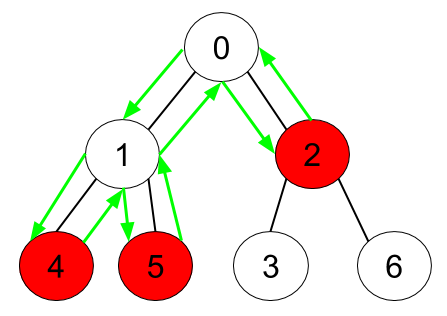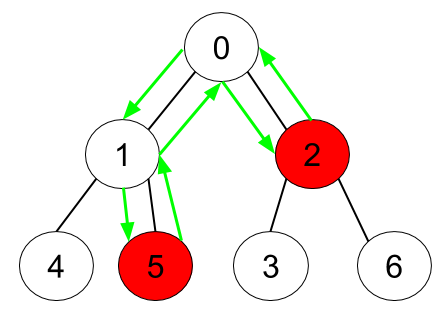1443. Minimum Time to Collect All Apples in a Tree
Description
Given an undirected tree consisting of n vertices numbered from 0 to n-1, which has some apples in their vertices. You spend 1 second to walk over one edge of the tree. Return the minimum time in seconds you have to spend to collect all apples in the tree, starting at vertex 0 and coming back to this vertex.
The edges of the undirected tree are given in the array edges, where edges[i] = [ai, bi] means that exists an edge connecting the vertices ai and bi. Additionally, there is a boolean array hasApple, where hasApple[i] = true means that vertex i has an apple; otherwise, it does not have any apple.
Example 1:

Input: n = 7, edges = [[0,1],[0,2],[1,4],[1,5],[2,3],[2,6]], hasApple = [false,false,true,false,true,true,false] Output: 8 Explanation: The figure above represents the given tree where red vertices have an apple. One optimal path to collect all apples is shown by the green arrows.
Example 2:

Input: n = 7, edges = [[0,1],[0,2],[1,4],[1,5],[2,3],[2,6]], hasApple = [false,false,true,false,false,true,false] Output: 6 Explanation: The figure above represents the given tree where red vertices have an apple. One optimal path to collect all apples is shown by the green arrows.
Example 3:
Input: n = 7, edges = [[0,1],[0,2],[1,4],[1,5],[2,3],[2,6]], hasApple = [false,false,false,false,false,false,false] Output: 0
Constraints:
1 <= n <= 105edges.length == n - 1edges[i].length == 20 <= ai < bi <= n - 1hasApple.length == n
Solutions
Solution: Depth-First Search
- Time complexity: O(n)
- Space complexity: O(n)
JavaScript
js
/**
* @param {number} n
* @param {number[][]} edges
* @param {boolean[]} hasApple
* @return {number}
*/
const minTime = function (n, edges, hasApple) {
const visited = new Set();
const edgesMap = edges.reduce((map, [a, b]) => {
const edgeA = map.get(a) ?? [];
const edgeB = map.get(b) ?? [];
edgeA.push(b);
edgeB.push(a);
map.set(a, edgeA);
return map.set(b, edgeB);
}, new Map());
const collectApple = (from = 0) => {
const edges = edgesMap.get(from) ?? [];
visited.add(from);
const time = edges.reduce((total, edge) => {
if (visited.has(edge)) return total;
return total + collectApple(edge);
}, 0);
return time + (from && (hasApple[from] || time) ? 2 : 0);
};
return collectApple();
};